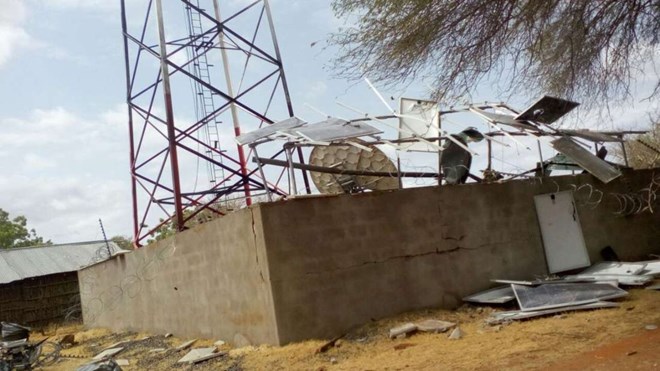
Sunday July 26, 2020

A communication mast that was destroyed by suspected Shabaab militia in a past attack. PHOTO | FILE | NATION MEDIA GROUP
As states adopt measures to halt the spread of Covid-19, an ‘Iron Curtain’ has descended across the Horn of Africa. A slew of responses to the pandemic have suppressed the activities of violent extremist and terrorist groups and reinforced existing counter-terrorism schemes.
Inversely, violent extremist groups have seized the Covid-19 crisis as an opportunity for growth and expansion. In the Horn of Africa, the outbreak of Covid-19 has further complicated the security and humanitarian crisis precipitated by the triple threat of desert locust invasion, floods and terrorism linked to the al-Qaeda-affiliated al-Shabaab Islamist group in Somalia.
The militia is adjusting to the new “normal” created by the crisis, exploiting it to recruit new members.
Al-Shabaab is aiding the spread of the pandemic. In the large swaths of territory the militia controls in southern and central Somalia, it has made little or no effort to implement containment or social distancing measures. Instead, it has disregarded public health warnings or directions from the government, which the group views as illegitimate, and resisted shutting down crowded mosques, Islamic schools and its own training camps.
TERRORISTS
The positive trend is that Covid-19 responses have reinforced existing counter-terrorism responses and reduced the operations and effectiveness of al-Shabaab and other terrorists operating in the Horn of Africa. Three positive drifts are discernible. First, since Covid-19 struck, the region has witnessed decreased recruitment activities in public spaces and other offline settings by al-Shabaab.
Owing to restriction of free movement of citizens and diminished crowded public spaces, the militia has been unable to attract new followers and recruit active members or to use some of the usual terrorist tactics such as bombings and vehicle ramming.
Covid-19 lockdowns have also deprived it of revenue from taxation or extortion and reduced its access to vital supplies such as food, medicine, money and weapons.
As such, since March, the militia has not carried out any remarkable, mass-casualty bombings or shootings. However, the militia has continued with its constant attacks against Somali security forces, government officials and civilians. Similarly, Amisom and US have continued with airstrikes against the group.
NATIONAL FOCUS
Second, Covid-19 responses have diminished al-Shabaab’s visibility in the media. With the international and national focus sharply on Covid-19, the terrorist organisation is unable to draw media attention to its activities, thus potentially minimising its impact and relevance. However, governments should monitor the alternative “attention-grabbing” targets or techniques that the group might resort to.
Thirdly, al-Shabaab is split and facing protests over its failure to protect its supporters against Covid-19. To halt this trend, in mid-March, the militia organised a “consultative forum” in Southern Somalia, which released a press release addressing the pandemic. The main aim of the forum was to enable the group to push for unification and mending of rifts following several internal fractures and fissures at the helm of its leadership.
The negative impact of Covid-19 on al-Shabaab is that the disease has created fertile grounds for its agents to radicalise and recruit new members.
The outbreak of Covid-19 has created a “perfect storm for the spread of disinformation, conspiracy theories and propaganda”. Al-Shabaab has spread disinformation, conspiracy theories and propaganda about the virus through online and offline platforms to sow public mistrust in authorities and its perceived enemies. In April 2020, its message portrayed the pandemic as “a divine punishment from Allah”, meted out to the non-believers across the world for their “evil deeds” against Muslims and jihadists. This stance on the virus has increased the vulnerability of those in the territory under its control to Covid-19.
Al-Shabaab is now exploiting the epidemic to attract followers and recruit new active members online through social media and other online forums. Covid-19 lockdown measures such as closure of schools, leisure activities, faith-based forums and workplaces have created a captive audience for the messages of terrorists.
Globally, nearly one billion students out of school scouring the internet for information face the risk of subscribing to extremism content.
Al-Shabaab is also preying on lapses in the preventive Covid-19 lockdown measures to drive its violent extremist agenda. It is casting its net wide to recruit from populations disenfranchised by high-handed law enforcement measures, which have also increased underlying grievance politics. As the disease festers, terrorists are waiting in the wings to exploit grievances arising from the reduction or disproportionate reallocation of resources to remote or under-served areas or protests against governments to attract new followers.
Covid-19 responses are also posing new challenges to the war on terrorism in the Horn of Africa. Al-Shabaab is shrewdly modifying its strategies for violent attacks. The militia might seek to intentionally spread the disease to whip public fear.
In Tunisia, two men were arrested for reportedly planning to infect security forces with Covid-19.
Counter-terrorism has also suffered from Covid-19 responses, which tended to halt and reduce international security and humanitarian assistance.
As states shift resources to defeat the new enemy, international security assistance is being diverted to fighting the virus. Amid the Covid-19 crisis, Amisom is under immense pressure to withdraw its troops from Somalia.
During the Covid-19 crisis, al-Shabaab and other terrorist actors are devising new ways of financing their activities.
It is reinventing itself as the provider of service, food and basic goods to ‘at risk’ populations.
On June 13, 2020, the group unveiled a Covid-19 isolation and care facility at its Jilib headquarters, which includes a “corona(virus) prevention and treatment committee”, a round-the-clock hotline and ready vehicles to ferry patients.
Governments in the Horn need to establish online resilience initiatives and campaigns and empower young people to increase resilience against recruitment.